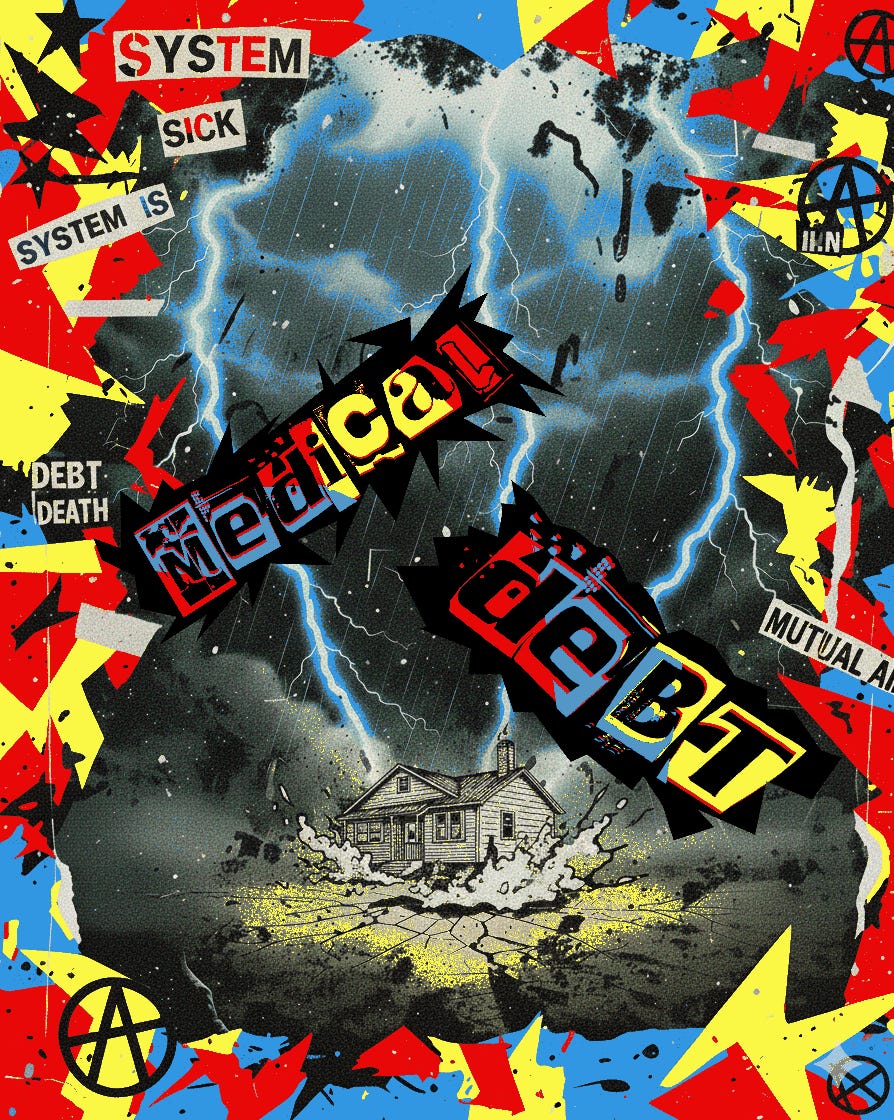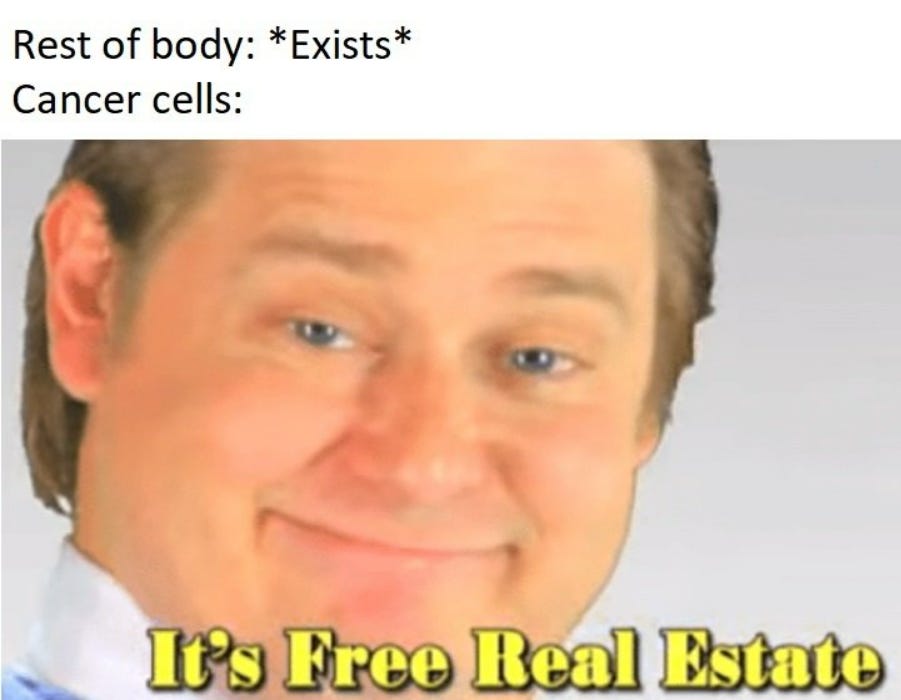Cancer's Real Fear Isn't Death
The Reverse Lottery We're All Losing
My Fear Isn't What You Expect
I fear cancer.
I don’t fear being ill. I’ve seen what awaits me in the worst-case scenario. I watched both of my parents fade at the ages of 51 and 69. I’ve seen a preview of the end. It ain’t pretty. Not to mention my own run-ins with sepsis, migraines, and degenerative disc disease. I’m not looking forward to it, but I’m not afraid of being ill.
It’s not a fear of death either. I buried siblings at ages 19 and 23. For clarity they were those ages when they died. I’ve been thinking about death for decades.
Poo-tee-weet. So it goes.
No, I fear cancer because I fear its cost.
Not cost as a metaphor. No, the dollars and cents cost.
I fear the costs that my wife and I would incur.
I fear for my wife and loved ones having to endure the insult of life altering debt in addition to the injury of my loss.
The Architecture of Kindness
The original version of this post had an Ezra Klein/Vox/Slate style rundown of the OMB projections of a single payer healthcare plan versus our current model. Very wonky. It’s obviously not a very convincing case, seeing as how its been made ad nauseum and nothing changes.
Not to mention, this Substack is about moral philosophy. What does that have to do with healthcare policy?
Architectural Humanism is about more than being nice to people. You don’t need to read Aristotle, Kant, and Singer to get to “be nice to people”.
Robert Fulghum nailed that in his essay “All I Really Need to Know I Learned in Kindergarten”.
“Share everything.
Play fair.
Don't hit people.
Put things back where you found them.
Clean up your own mess.
Don't take things that aren't yours.
Say you're sorry when you hurt somebody.”1
Being kind to people counts for little if the world around us burns to the ground.
Being the nicest person on a pile of ashes is a pretty empty award to win.
The idea is that we hone ourselves using the Ledger. Using empathy and reason doesn’t end with the person in front of us.
If it does then it really counts for nothing.
So let’s scale these ideas up.
The $174,000 Problem
My fear about a long-term medical crisis is absolutely real. A study published in 20202 showed that a cancer diagnosis was associated with a $125,832 reduction in total net worth for the household.
I just hit a positive net worth at age 41. I’m 46 now. I have six figure corporate job… but I also own every current gaming console on the market.
And I upgrade my gaming laptop every other year.
So while I’ve got some assets, I’m not exactly always making the best fiscal choices for myself. That’s not even taking into account the money I’ve given to friends, family, and strangers on the street. I buy $150 in Girl Scout cookies from a troop in NYC every year… and let them donate the cookies. I live in Florida.
Benefits of growing up in extreme poverty. It’s hard to say no to myself when there is a poor dirt ten-year-old inside of me that is afraid the opportunity will evaporate.
Like that poor racoon with his cotton candy in the stream.
A $125K hit to my net worth would basically roll back a large percentage of what I’ve pulled together in the prior five years. Actually, it’s worse than that. The study pulled data through 2014, and everything in it is denominated in 2015 dollars.
Since 2015, healthcare has not grown more affordable. And $125K in 2025 dollars is $174K, at the time of writing.
Here’s the thing… other than my profligate spending on gaming and YOLO attitude on charitable giving, I’ve done it all right.
I went to college, got a degree in business.
I got a job at a blue chip company, and worked my way up.
I have health insurance as good as, if not better, my peers at comparable firms.
I do cardio. I watch my diet. I even take seriously preventive care, getting regular physicals, flu shots, hell, I got my colonoscopy the same month I turned 45.
But if some rogue cells in my body look around and decide, “its free real estate”, in all likelihood all of that will be for naught.
I can handle getting sick. But the potential $174K hit doesn’t just affect me. It affects my wife too. And those organizations who get regular donations from me. And the people who may turn to me for help in the future. It ripples. It cascades. And ultimately, it’s out of my control.
And that’s me, who on paper should be in a position to absorb such a hit. What about the people who forgo the physicals because the decision is between a copay and keeping the electric bill paid? Who don’t have the time or money to invest in a 1,000 mile a year running habit… or a Peloton bike?
The people whose next time seeing a doctor will be in the ER, because they can’t afford all the steps that would prevent that?
A Reverse Lottery, Rigged to Lose
Ledger Ethics tells us that we approach moral decisions with empathy and reason. It tells us that we owe others more than we can ever repay. It tells us even inaction has a cost.
Every day we go out into a world where something out of our control can wreck our lives. Like a car wreck. Being the best driver in the world doesn’t prevent another driver from putting you on disability the rest of your life.
Empathy tells us that the fears we have, other people have them too. Reason tells us that if the system we live in is built in such a way that random chance can wipe out someone financially, then that system is unjust.
If for no one else, we owe it to ourselves to find a better way.
This post is not going to turn into a policy breakdown. Don’t worry, I have strong opinions about the US healthcare system should be reformed, starting with the zany idea that healthcare should not be done for profit.
No, what I am trying to communicate here is how we scale up this moral framework to something more than general kindness. The same ideas and tools I write about in dealing with people apply to the systems we live in too. Because those systems are built out of people, built for people, and affect everyone in our lives. Whether we want them to or not.
And our healthcare system? It is built in such a way that it bankrupts the sick. It is designed to return profits to shareholders. But the side effect of that is every one of us, except for those few privileged enough to be wealthy beyond worry, can become the winners of a reverse lottery at any time.
The debate in this country is often framed around giving benefit to only the deserving.
But cancer doesn’t select the evil, or the just. Strokes do not evaluate one’s net worth before they strike. An uninsured driver isn’t aiming for the most expensive car on the road.
Empathy tells us that if we don’t deserve to have cancer, then we cannot decide that others do. Reason tells us that there must be a better way to deliver healthcare in the wealthiest nation on earth. A way that allows everyone to share the cost.
Illness, injury, they are the two edges of a Sword of Damocles hanging over everyone’s heads. The good, the bad, the mid. But to blunt that blade, we have to do more than hope it lands on someone other than us.
To let this system of random chance persist with no change? To allow for harms beyond the physical to happen when we could reduce or even eliminate them? That’s an evil of indifference. It goes on everyone’s ledger.
The ledger is recorded whether we want it to be or not.
A healthcare system that ruins the lives of those it aims to heal records those debits in blood.
To keep things the same as they are? That leaves our ledgers dripping, gushing in red.
It Starts with You
It is a “we” problem. But even those start with you.
It starts with how you look at others. Like everything I write about, it starts with bearing witness. Can you truly say that there are people undeserving of healthcare? What if the situations of the “underserving” were swapped with yours? Would you agree that you were undeserving?
Changing your perspective can lead to changing your individual architecture and the architecture of the systems you participate in. Systemic change happens when enough people in the system can no longer tolerate things the way they are and come together to build a better system.
That can mean many things in practice. How you vote. If you get involved in advocacy. Even just a change in your perspective matters, and that begins with seeing others as intrinsically deserving of good as you believe yourself to be.
We live in an individualistic society, no doubt. And that isn’t going to change. But most of us start our lives in the healthcare system. We will likely end our lives there too.
The costs are borne by all of us. When someone is uninsured, and therefore neglects preventative care that they can’t afford, leading to a dramatic medical intervention that creates a debt never to be paid? That doesn’t just affect that person.
The unpaid costs don’t go away. The rest of us pay it in rising premiums, higher copays, and reduced coverage for higher cost. A disabled parent or a dependent child may lose a caretaker, depending on the outcome of the dramatic, yet preventable, medical episode. A business loses an employee. A community loses a volunteer, a thread of its fabric, and a friend.
Empathy tells us it’s not fair that some profit greatly while others are financially ruined by a system that we all must participate in.
Reason says that since you cannot truly opt out of the healthcare system, we can find a better way to shoulder the burden together instead of letting it crush a random family on a random Tuesday. Because that family might be yours.
The Moral Case
From a utilitarian perspective delivering quality healthcare to some while most are subject to the potential of a Zeus-like smiting of their financial freedom is not the greatest possible good.
Then there's the argument from deontology, or duty-based ethics. This often centers on the right to freedom, the independence from being constrained by another's choice. Some argue that paying for another's healthcare constrains their freedom. Some might say that spreading an equal cost with unequal benefit constrains their choice and is not an innate right. After all, why should person A pay for person B’s healthcare?
To that I say the constraints of the current system, with employer-based insurance, network restrictions, and medical bankruptcy, already impinge on our freedom. Those elements together reduce my ability to start my own business or pursue career that is a passion because I cannot reasonably gamble my healthcare on those things.
When the alternative is death or bankruptcy, "choosing" employer-based insurance isn't a free choice. It's coercion with extra steps.
We are all literally born into the existing system of commodified healthcare, opted in without our consent.
Virtue ethics asks us what kind of society we want to be. I would rather live in a society where the randomness of illness or injury will not doom me, or anyone else, to financial ruin.
The system we have today is morally compromised.
It doesn’t have to be.
What are you going to do about it?
If you're ready to explore practical philosophy for everyday ethical decisions, without the academic jargon, subscribe to Radical Kindness: Empathy as Rebellion. Every week, I share frameworks for navigating moral complexity, personal stories of growth through adversity, and tools for building a more ethical life.
Join a growing number of thoughtful readers who are figuring out how to be good humans in a complicated world.
Fulghum, R. (1988). All I really need to know I learned in kindergarten: Uncommon thoughts on common things. New York: Villard Books.
Pak, T. Y., Kim, H., & Kim, K. T. (2020). The long-term effects of cancer survivorship on household assets. Health Economics Review, 10(2). https://doi.org/10.1186/s13561-019-0253-7





